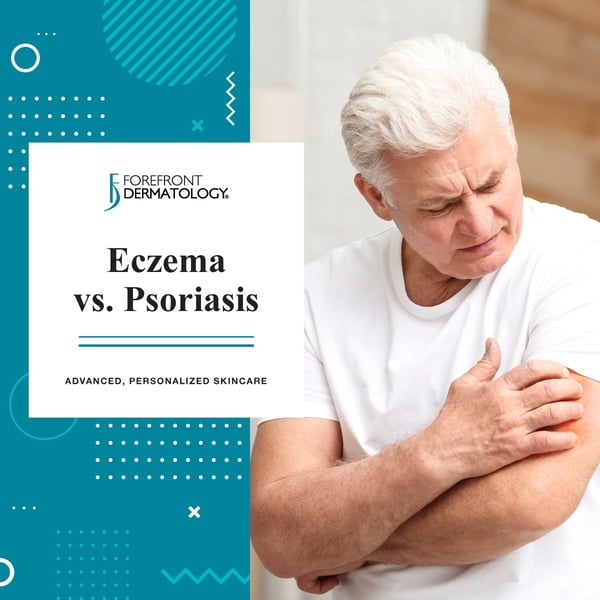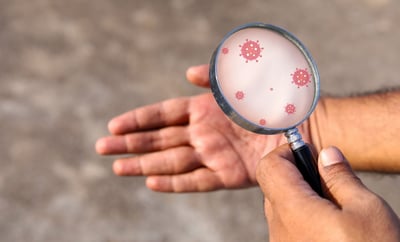
Red, dry and itchy skin conditions cause problems for millions of Americans, affecting both physical and emotional health. The two most common conditions behind these issues are psoriasis and eczema. You may not have seen the dermatologist yet and are curious if you have eczema or psoriasis. While we suggest scheduling an appointment with your local dermatologist to receive diagnosis and treatment, here is some quick information on the difference between eczema and psoriasis:
What is Eczema?
Eczema is a condition that causes the skin to become red, itchy and inflamed. It appears as dry or scaly patches and can develop anywhere on your body. While it isn’t contagious, there are 8 different types of eczema that can develop as a result of environmental triggers and genetics. It is estimated that over 30 million Americans suffer from Eczema.
What is Psoriasis?
Psoriasis is a skin disease associated with the immune system which causes your skin cells to reproduce too quickly. A normal skin cell matures and falls off the body’s surface in 28 to 30 days. However, skin affected by psoriasis takes only three to four days to mature and move to the surface. Instead of the cells falling off, they pile up and form scaly lesions. Psoriasis flare ups are caused by triggers. Triggers are not universal, but four main factors include stress, skin injury, infection and alcohol.
What is the difference between Eczema and Psoriasis?
According to Dr. Gabriela Maloney, board-certified dermatologist with Forefront Dermatology, “While psoriasis and eczema develop in a similar form they do have a few differences. Eczema is commonly a direct result of environmental triggers, while psoriasis is also triggered, it is a direct result of a faulty immune system. Psoriasis tends to cause mild itching, while eczema causes intense itching, typically at nighttime. Additionally, psoriasis can, at times, cause joint stiffing and swelling, where eczema does not. Eczema tends to effect children more than adults, but commonly subsides by age 5 or 6.”
How do you manage Eczema and Psoriasis?
“For both eczema and psoriasis there are treatment options available to help prevent flare ups and alleviate the symptoms,” added Dr. Maloney. “For psoriasis, treatment depends on how serious the disease, the size of the psoriasis patches and the type of psoriasis. Treatments work differently for each sufferer. Your dermatologist may switch treatments if one doesn’t work, if there is a bad reaction or if your current treatment stops working. For eczema, the condition is manageable with consistent treatment plans. Common treatment options for both eczema and psoriasis include topical treatments, light therapy, prescription medication or combination therapy. Additionally, it is important to learn what triggers your eczema or psoriasis and avoid exposure to it.”
Skin Struggles?
At Forefront Dermatology, we know that life is all about the moments when you don’t need us. That’s why we’re here for all the moments when you do. We offer comprehensive and compassionate care for all skin conditions and create customized treatment plans for all ages – even the tiniest of patients! Find a dermatologist near you today.





